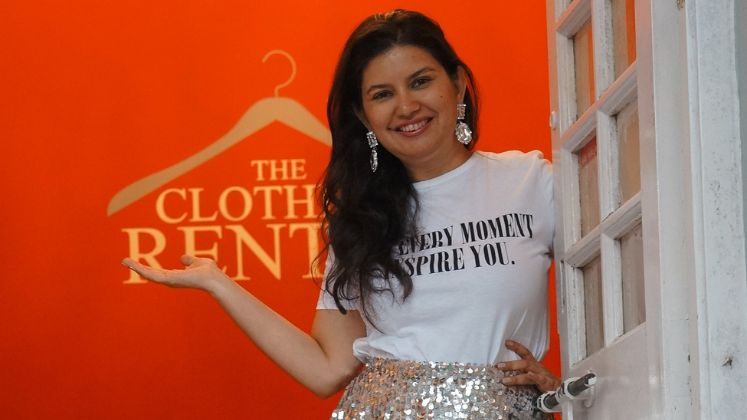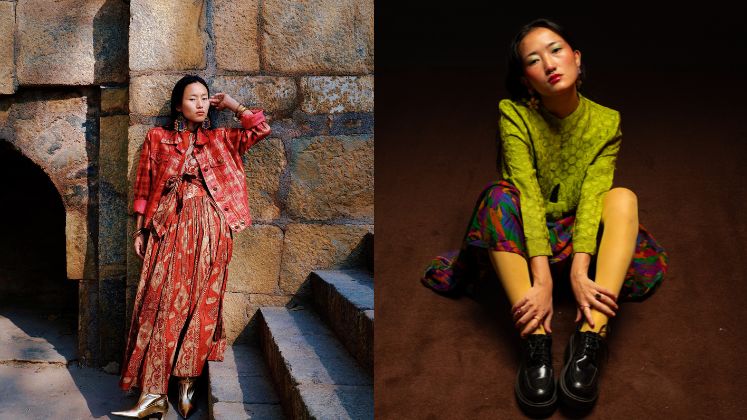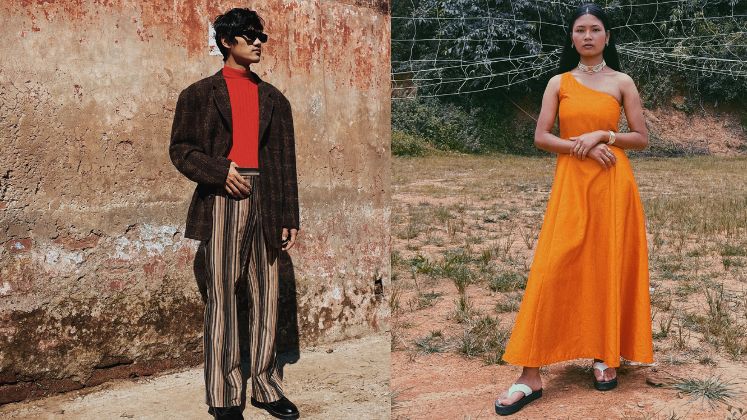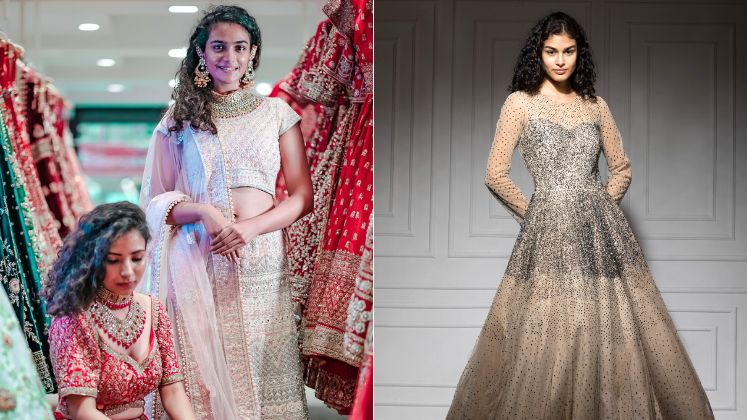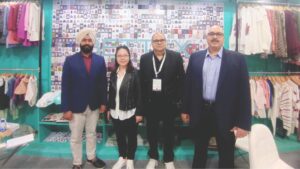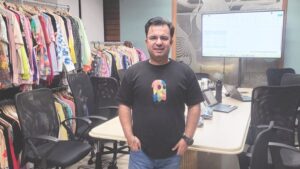The fashion system generates massive waste, ranking amongst the planet’s most polluting industries. Over 100 billion garments are produced annually, with only 1 per cent actually getting recycled and 85 per cent being discarded in landfills or incinerators. Despite this, a rising global consumer demand for sustainability, with 60 per cent prioritising eco-friendly practices, is pressuring the industry to adopt more environmentally conscious approaches.
As sustainability has become more of a priority for consumers, the demand for alternatives has soared in the form of secondary fashion retail businesses that include pre-owned, pre-loved, rental and thrift. These models, although not new, are picking up in India as they offer consumers access to affordable, well-crafted and high-quality garments and accessories, empowering individuals to flaunt functional and stylish wardrobes while contributing to a more sustainable fashion industry. This recent growth is driven by several factors, including the rise of social media, the increasing cost of clothing and the increasing inclination toward sustainability.
One of the main reasons influencing the popularity of rental fashion is consumer’s heightened interest in eco-friendly and cost-effective trends. Furthermore, technological advancements have enabled companies to expand offerings, converting buyers to renters.
The global fashion rental market is projected to grow at a CAGR of 11 per cent from 2021 to 2031. Millennials are driving this shift, favouring renting for its cost-effectiveness and aligning with their desire for fashion-conscious choices.
The impracticality of owning numerous outfits, especially expensive occasionwear, also impacts this growing trend. Gen Z rejects societal consumption pressures, embracing conscious choices without compromising style.
The rapidly growing global market for pre-loved and second-hand fashion is a testament to shifting consumer values towards sustainability, affordability and the desire for unique and vintage items. While it’s challenging to provide an exact figure due to the decentralised nature of the market and varying definitions of what constitutes pre-loved or second-hand fashion, estimates suggest that the market is substantial. According to insights from ThredUP, a prominent online consignment and thrift store, projections anticipate the global second-hand apparel market to soar to a value of US $ 64 billion by 2024, underscoring its impactful significance.
In India, while the landscape for pre-loved and second-hand fashion is still in its infancy compared to other regions, it’s steadily gaining ground. However, with increasing awareness about sustainability and affordability growing among Indian consumers, coupled with the rise of online platforms and marketplaces specialising in second-hand fashion, the market is expected to expand rapidly in the coming years.
RENTAL FASHION
Globally, the second-hand apparel market was estimated at US $ 71,225.6 million in 2022 and is projected to expand at a prolific CAGR of 14.8 per cent from 2022 to 2032, reaching a valuation of US $ 282,748.6 million by 2032. Post-pandemic, seven popular resale and rental platforms like The Real Real, Depop, Rent the Runway, Vestiaire Collective and ThreadUP reached billion dollar valuations.
When it comes to India, IMARC Group states that India’s second-hand luxury goods market is expected to reach US $ 1,060.8 million by 2028, exhibiting a compound annual growth rate of 12 per cent (during 2023 – 2028).
Currently, the sales of used luxury items are experiencing a surge in India, driven by the rising aspirations of young shoppers and consumers in Tier-2 and Tier-3 markets.
Despite global indications of a slowdown in the luxury goods market, India-based Luxepolis, an online platform with a user base of 3.5 million, has reported over 80 per cent growth in sales this year.
In the domestic market, a multitude of omnichannel Indian fashion rental platforms, including The Clothing Rental, Flyrobe, Stage3, Rent It BAE, Lionise, Date The Ramp and Rent An Attire, have emerged in the last decade. These platforms aim to cater to the evolving preferences of contemporary consumers and tap into the growing trend of sustainable and accessible fashion. Interestingly, most of the prominent brands in the segment acknowledge the significance of Gen Z consumers in shaping their future customer base, identifying resale as a means to attract younger consumers to their product line-up.
“When we started The Clothing Rental nearly two decades ago, rental was kind of an unheard concept. People had a mental stigma against pre-worn clothes, there were concerns about hygiene and confusion regarding the process. However now, people are understanding the affordability of renting vs. buying. The growth of social media has put a pressure on looking good and not repeating clothing. Buying, drycleaning, and storing occasionwear has become expensive and that has given a growth to fast fashion, pre-owned and rental models,” Shilpa Shankar Bhatia, Founder of The Clothing Rental, told Apparel Online India in an exclusive interview.
| “The key motivation driving Indian consumers to choose fashion rental over traditional retail is undoubtedly affordability. Many consumers are driven by the price, where they still aspire for a stand-out look but spending that much on one-time wear for only a few hours does not justify spending tonnes of money. For example, a nice Indian lehenga at Aza or Pernia’s pop-up could cost you upwards of anywhere between Rs. 30,000 and Rs. 1.20 lakh, however if you could rent a similar piece for Rs. 5,000 or Rs. 20,000, you would be tempted too.” Shilpa Shankar Bhatia Founder of The Clothing Rental |
Established in 2005, The Clothing Rental is India’s first premium fashion rental destination. run by stylists and technology entrepreneurs. It offers a curated list of Indian and westernwear for men and women, alongside other categories such as pre-wedding and maternity gowns in a range of sizes and boasts of brands and designers such as Anushree Reddy, Rimple Harpreet, Manish Malhotra, SVA to name a few.
“Initially, individuals rented primarily for affordability, but with growing awareness, practical considerations have become a driving force. The number of buyers opting for rentals has notably risen. Societal attitudes towards fashion rentals have shifted, with people openly embracing and showcasing their rented looks online and in society, challenging previous taboos associated with rental fashion,” Aanchal Saini, CEO, Flyrobe, Founder, Rent It Bae said.
| There are stringent criteria for inbound inventory, including considerations for pricing, fabrics and colours. Balancing trends and durability is crucial since each product undergoes multiple rental cycles, requiring alterations and rounds of drycleaning after each use. Regarding sourcing, we utilise both marketplace options and our owned inventory to ensure a diverse and high-quality selection.” Aanchal Saini CEO, Flyrobe, Founder, Rent It Bae |
Flyrobe’s target market primarily includes fashion-conscious individuals who are seeking a cost-effective and sustainable approach to access a diverse range of clothing for various occasions. The platform caters to those who appreciate the value of renting expensive and fashionable outfits, whether it’s for special events, parties or simply to experiment with different styles. Amongst the esteemed brands available are Sabyasachi, Amit Aggarwal, Tarun Tahiliani, Marwar Couture, Gaurav Gupta, Dolly J, etc.
PRE-LOVED AND SECOND-HAND FASHION
In terms of the pre-owned luxury goods market, the demographic comprises individuals who appreciate luxury fashion but seek a more sustainable and accessible approach to it.
It is estimated that, in 2024, the rental fashion and pre-loved luxury goods market is set to grow exponentially. Research states that the circular economy will claim a major stake in the luxury industry in the coming years.
The Luxury One, brainchild of Divya Lalwani, was founded with the vision of making luxury fashion more accessible to a wider audience, while promoting sustainability in the industry by offering a curated selection of pre-owned luxury items.
“Consumers, particularly millennials and Gen Z, are actively seeking sustainable and affordable alternatives. The preference for online platforms has significantly increased, showcasing a digital shift in consumer engagement. Furthermore, there is a rising appreciation for individualistic style, emphasising uniqueness and the affordability of pre-loved fashion items. These changes reflect a broader movement towards conscious and mindful consumer choices, shaping the dynamics of the second-hand fashion market,” Divya Lalwani told Apparel Online India in an exclusive interview.
By extending the life cycle of these products, the company contributes towards reducing the environmental impact associated with the production of new items.
Divya added, “Our focus on circular fashion encourages a more conscious and responsible approach to consumption. We believe in the beauty of well-made and timeless pieces that can be enjoyed by multiple owners, aligning with the principles of sustainability and circularity.”
| Chanel was the most popular pre-loved brand for resale in 2023, followed by Hermes, Rolex, Louis Vuitton and Cartier. The most popular categories for resale include bags at 49%, followed by watches at 21%, jewellery at 13%, clothing at 9% and shoes at 4%, according to Gugus, a platform that specialises in selling pre-owned luxury goods. |
The brand stands out in the competitive second-hand and pre-loved fashion segment through a curated selection of luxury items, encompassing renowned brands such as Chanel, Louis Vuitton, Hermes, Gucci, Burberry, Rolex, Cartier and more. Its primary category features handbags, followed by footwear, sunglasses, jewellery and accessories and its commitment to making luxury appealing and approachable is reflected in attractive and competitive pricing on both new and pre-owned items. Ensuring transparency and authenticity, every product undergoes a rigorous authentication process.
| “The Luxury One team aims to bring its customers the relief of buying just the originals. We aim to carefully inspect luxury items and redact ones that do not pass our quality checks. The team has experienced professionals that have a great eye for vetting all the factors necessary for declaring a product authentic. Our authenticity checks also involve the products being listed on the website being approved by professional authenticators. We ensure that everything is right from stitching and labels to the quality of leather and the codes on the products.” Divya Lalwani Founder, The Luxury One |
Spoyl is another such online platform where users can buy and sell pre-owned clothing, accessories and footwear. It offers a wide range of affordable fashion items from both Indian and international brands. Elanic is a peer-to-peer marketplace for buying and selling pre-loved fashion, beauty and lifestyle products. Users can list their gently used items for sale and buyers can discover unique and affordable fashion finds. Once Again is an online thrift store that offers a curated selection of pre-owned clothing, accessories and home decor items. It focuses on sustainable fashion and offers a mix of vintage and contemporary styles.
| THE CLOTHING RENTAL COMPANY Product Categories And Pricing• Men’s Indian and Westernwear Rs. 3500 onwards • Women’s Westernwear Rs. 4000 onwards • Women’s Indianwear Rs. 4000 to Rs.30,000• Pre-wedding • Maternity gowns Sizes XS , S, M, L, XL For women’s bust size: 32”, 34”, 36”, 38” Mens’ shirt size: 38, 40, Anushree Reddy, |
THRIFTING
Thrifting is the art of seeking second-hand or pre-loved treasures, commonly at thrift stores, consignment shops, garage sales or flea markets. This activity entails perusing an array of items with the goal of uncovering distinctive or budget-friendly gems. In recent years, the term ‘thrifting’ has surged in popularity, specifically due to its sustainable and cost-conscious approach to acquiring clothing, accessories and household items. It celebrates the joy of uncovering hidden gems and the excitement of securing fantastic deals through the exploration of second-hand goods.
A rising trend on Instagram and TikTok involves an increasing number of sustainable fashion influencers who actively engage in thrifting. Their content often features the best bargains they’ve discovered or highlights their unique vintage finds, inspiring their audience to embrace sustainable and budget-friendly fashion choices.
India also has its own legion of one-of-a-kind pieces that add value to one’s closet. Bygone Echoes (Instagram: @bygoneechoes) by fashion stylist Dennis Hauzel is one such platform that offers exclusive, covetable pieces.
| BYGONE ECHOES: THRIFT STORE Product Categories And Pricing• Jackets, Coats, Sweaters, Dresses, Skirts, Corsets, Trousers, Shirts and Tops for men and women Rs.500 to Rs.6000 |
Dennis possesses a discerning taste for vibrant and bold prints that exude an eccentric yet cool vibe. So it comes as no surprise that his collections of thrifted clothing sell out within seconds of their release, reflecting the widespread appeal of his unique and stylish finds.
“The movement’s embrace is a testament to people awakening to the art of breathing new life into clothes, steering away from the throwaway culture. It mirrors a rising consciousness, with individuals opting for a more deliberate, mindful pace in life and wardrobe choices,” Dennis Hauzel, Founder of Bygone Echoes, told Apparel Online India. “What’s particularly exciting about this movement is its inclusive nature, inviting everyone to be a participant, breaking away from the narrative dominated solely by conglomerates. It’s a shared journey toward sustainability in the fashion market.”
| “My approach is spontaneous; there’s no set agenda other than selecting pieces I genuinely like. Whether it’s a find from Sarojini, the lanes of Humayunpur or the small thrift store in my hometown, I’m drawn to pieces that resonate with my taste. I go the extra mile to minimise effort by selecting pieces that meet the highest standards. From construction to stitch quality, I only pick up items that are truly irresistible and it typically takes about a week for me to source, wash, sell and dispatch the items.” Dennis Hauzel Founder, Bygone Echoes |
The authenticity of Dennis’ brand is its greatest strength. He doesn’t strive to fit a mould – what he releases is a genuine reflection of his personal taste and this approach of staying true to himself has resonated positively with people, which is one of the main reasons that set his brand apart from the thousands in the mix.
Alongside Dennis’ thrift store, there are tens and thousands of Indian companies and influencers who are running successful thrift stores on social media platforms with an active consumer base. These companies provide Indian consumers with convenient and sustainable options for shopping for pre-loved and second-hand fashion, contributing to the circular economy and reducing waste in the fashion industry.
For instance, That Boho Girl (Kritika Khurana) is a popular fashion influencer who advocates for sustainable fashion practices, including thrifting. She often shares her thrift finds and styling tips on social media platforms like Instagram and YouTube. House of Second Hand is another such online thrift store based in India that offers a curated selection of pre-loved clothing, accessories and home decor items. It sources its products from individuals and resells them at affordable prices.
Instagram based Indian Thrift Store sells pre-loved clothing, accessories and lifestyle products. It offers a range of items for men and women, including clothing, bags, shoes and jewellery, whilst Kabaad Ka Jugaad also offers a curated selection of second-hand clothing and accessories. It focuses on promoting sustainable fashion and ethical consumption practices.
THE CONSUMER
In recent years, the rental fashion market has become popular as consumers seek more eco-friendly and cost-effective methods to experience the latest trends. Due to technological advances, companies have been able to broaden their approach and expand their product offerings and services, helping convert buyers into renters and unlock the potential fashion rentals possess.
Millennials are reshaping their shopping habits, driven by environmental awareness and a desire for fashion-conscious choices. Renting, favoured for its cost-effectiveness and fashion appeal, aligns with millennials’ social media-driven culture of avoiding outfit repetition. The impracticality of owning numerous outfits, especially expensive occasionwear, fuels the popularity of rentals, catering to millennials’ preference for access over ownership. This cultural shift also celebrates pre-loved clothing, challenging fast fashion norms. At the same time, Gen Z, rejecting societal consumption pressures, embraces conscious choices without compromising on style, marking a transformative era.
In recognising India’s diverse demographics, it is observed that certain fashion categories remain popular across all regions. Flyrobe and Rent It Bae’s commitment to catering to diverse consumer preferences is evident in their inventory, with 20 per cent dedicated to region-specific products. “There’s a notable demand for designer sarees in the South, a trend not as pronounced in the North. This approach allows us to offer a curated selection that aligns with regional tastes, ensuring a more personalised and relevant fashion rental experience for our customers.” Aanchal explained.
KEY GROWTH DRIVERS
The recent growth is driven by several factors, including the rise of social media, the increasing cost of
clothing and the increasing inclination towards sustainability.
“As people become more conscious of their environmental impact, the appeal of second-hand fashion, with its emphasis on reusing and recycling, has significantly increased. Additionally, the rise of online platforms has played a pivotal role. The ease of buying and selling pre-owned items through digital channels coupled with the convenience, variety and often discounted prices offered by these platforms have contributed to their popularity among Indian consumers,” Divya said.
“The aspirational value associated with owning luxury or high-end fashion items has driven the demand for pre-loved pieces. Consumers can now indulge in their love for renowned brands without compromising on their commitment to sustainability.”
During the wedding season in India, the inclination towards purchasing new, trend-lead outfits increases, discouraging the repetition of ethnic purchases for a year or two due to wear and tear, resulting in a financial strain. In response, urban Indians are increasingly adopting hassle-free renting as a stylish and economical option, signifying a noteworthy cultural transformation and a forward step into the future.
“The key motivation driving Indian consumers to choose fashion rental over traditional retail is undoubtedly affordability. Many consumers are driven by the price, where they still aspire for a stand-out look but spending that much on one time wear for only a few hours does not justify spending tonnes of money. For example: a nice Indian lehenga at Aza or Pernia’s pop-up could cost you upwards of anywhere between Rs. 30,000 and Rs. 1.20 lakh, however if you could rent a similar piece for Rs. 5,000 or Rs. 20,000 rupees, you would be tempted too. Plus one need not worry about spending on dry cleaning it,” Shilpa explained.
At Flyrobe, the rental price is approximately 10 per cent – 15 per cent of the M.R.P. Eg: If a lehenga sells at one lakh, you can rent it for 10,000 – 15,000.
“The growing awareness of sustainable fashion practices has led consumers to choose rental as a more eco-friendly option, reducing the environmental impact of fast fashion. The desire for variety and the ability to wear different outfits for various occasions without the commitment of ownership also drive the preference for fashion rental. Additionally, every Indian household facing storage issues finds fashion rental appealing, as it alleviates the need for storing infrequently worn clothing. Moreover, the convenience of online platforms and the flexibility they offer in terms of browsing, ordering and doorstep delivery further contribute to the popularity of fashion rental in India.” Aanchal stated.
MARKET PULSE
With a growing number of consumers adopting ethical and eco-conscious decisions, the demand for second-hand fashion is projected to increase. Additionally, the entry of new players, inventive business models, and strategic collaborations within the sector signal a dynamic and evolving marketplace.
Resale can be a powerful tool to attract new customers, especially younger and less affluent ones. Over time, as these customers develop brand loyalty and higher incomes, they are likely to trade up. The real concern then for companies is the possibility of someone else selling their used products if they do not engage in resale themselves.
Brands like French Connection, M&S, Lululemon, Hugo Boss and Burberry are responding to Gen-Z’s growing concerns about carbon footprints by moving towards rental and resale. In Europe, both H&M and Zara run their own buy-back schemes, with the latter looking to offer repairs and resale services too.
Circular business models encompassing rental and resale have the potential to take 23 per cent of the global fashion market by 2030, as rising consumer awareness of sustainability along with cost of living pressures come to bear.
ADDRESSING CHALLENGES
The barriers consumers find unappealing in rental fashion and pre-owned fashion are garment maintenance, hygiene and quality issues.
At Flyrobe, Rent It Bae and The Luxury One, stringent quality control procedures are implemented both before and after each rental transaction. When a product is added to the inventory, it undergoes a meticulous quality check to evaluate durability. After rental and return, items go through cleaning, sanitisation and another round of quality control to manage wear and tear, ensuring sustained quality for maximum rentals. Each piece undergoes a comprehensive authentication process to guarantee genuineness and alignment with the brand’s prestige. The focus is on items in excellent or like-new condition, prioritizing exclusivity and rarity. Trained experts handle refurbishment, addressing wear or imperfections, followed by authentication verification and rigorous quality control checks.
The segment is additionally grappling with various operational challenges, with a particular emphasis on the complexities of inventory management. These challenges include addressing situations where a product is booked multiple times with closely spaced dates, ensuring timely delivery to every customer, managing customisations and allowing sufficient time between services for refreshing or drycleaning.



